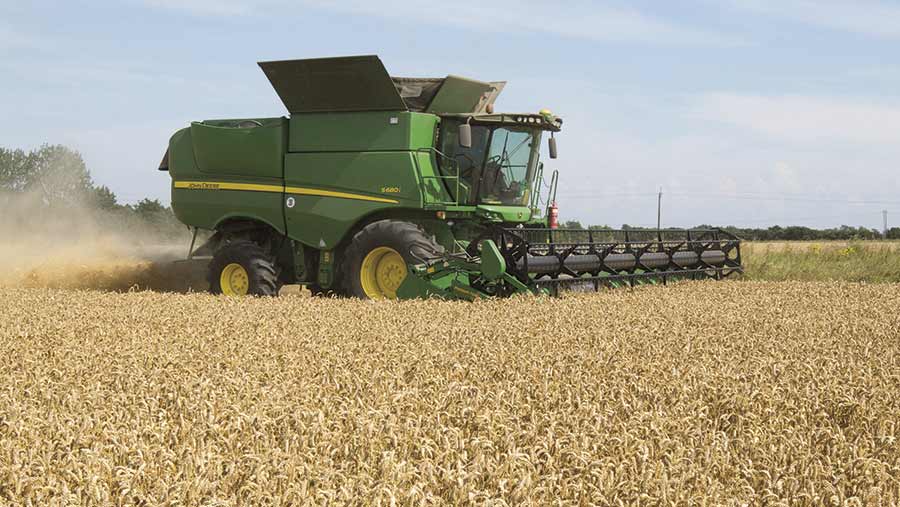Legal, tax and management tips for a smooth harvest
 © Tim Scrivener
© Tim Scrivener Farmers Weekly’s harvest webinar is packed with practical farm management, employment, tax and financial advice to help harvest go more smoothly.
The advice comes from our Business Clinic partners – Savills, law firm Thrings and accountant Hazlewoods.
See also: Watch the harvest webinar
Tom Brunt, food and farming consultant and director, Savills
Extra staff at harvest
- Be realistic about how long you will need temporary workers for – can you share with neighbours to spread the extra cost?
- Accommodation – make it clear what’s on offer, if anything, or where it might be available if not on farm. Housing must be legal – for example, appliances tested, gas and electrical safety checks carried out, whether in mobile homes or cottages.
- Check harvest employees have the relevant qualifications and training for the machinery they will operate.
- Take copies of certificates and licences when they apply for the job so you have them on file.
- Have a simple handbook for temporary staff, with basic information needed when they start the job – contact numbers, emergency contact numbers, a farm plan with field names, and cropping, point out any hazards such as dangerous field exits, bad junctions, overhead cables
- Give new staff a tour of the farm and chance to operate machinery they are not used to.
- Planning a staff rota can be challenging but it’s important to allow all staff to get good breaks and time off – fatigue leads to accidents and does not help productivity or profitability.
 Tom Brunt
Tom Brunt Food, farming consultant and director, Savills
Machinery
- Have a basic checklist, for example, trailer brakes, spare wheel tyres, lights – is it all in order and road legal? Having it down on a list means it can be checked off.
- Insurance – review policy regularly but when taking on casuals, check age limits – policy may restrict machinery operation to those 25 years and older.
- Borrowing machinery – always let insurer know if using other peoples’ kit to check cover.
- Legal ages – certain vehicles also have legal age limits, for example, combines can be driven only by those over 21, same applies to tracked vehicles unless articulated.
- Wide loads up to 4.3m need no escort but it’s often useful to have one especially if moving around busy areas. If wider than 4.3m you need to apply to local police for a dispensation which can take a few weeks to get.
Grain management and marketing
- Check fumigation withdrawal periods for stores.
- If considering leasing additional storage, cost it properly – extra transport and handling costs can outweigh its value.
- Keep decent store records so you can match what has moved against which contract and when – this helps with year-end calculations too.
Health and safety
- Health and safety should be a culture. Treat temporary staff just the same as others – give them a copy of your health and safety policy, a chance to read it properly and ask any questions.
- Provide correct protective equipment in good working order and ensure staff know how to use it.
- Have regular staff meetings to go through important points.
- Contractors – treat them the same way as employees. See that they operate in a safe way, ask to see their health and safety and insurance policies – you are liable as much for their actions as you are for those of your employees.
Post-harvest review
- Don’t repeat mistakes next year – have a review, involve staff – how could it have been done better or cheaper?
- Is distant land being farmed profitably?
Natalie Ward, associate solicitor, employment, Thrings
Staff status – employed or not?
- It is important to understand the status of staff. When taking on independent contractors, if they are to be considered self-employed it must be a business-to-business type arrangement. If someone is in business on their own account then they are likely to pass this test and can be paid gross – but if they are a worker they will be entitled to certain employment rights such as holiday and sick pay, the national minimum wage and to have tax and national insurance deducted.
 Natalie Ward
Natalie Ward Associate solicitor, employment, Thrings
Paperwork
- Written terms of employment are a legal obligation and must be provided within two months of the start of employment – this is best in a contract but the basic terms can be set out in a letter.
Right to work
- Any employee must have the right to work in this country – it’s a legal obligation for the employer to carry out right to work checks. Penalties for employers are up to five years in prison if someone is found to have been employed illegally and the employer cannot prove the correct checks were made before employment started.
- Ask to see documentary proof of the right to live and work here – passport, ID card, registration document. Take copies of these so you can prove you saw them.
- Treat all prospective employees the same in this regard, otherwise y, u could face a discrimination claim.
Working hours
- The working week is a maximum of 48 hours, with prescribed periods of rest.
- Employees can work for longer providing the average over 17 weeks is less than 48 hours.
- In addition, employees can opt out of the 48-hour week limit, as long as they have signed a standalone opt out and this is kept on record.
- All employers must ensure employees are not overworked, and do everything they can to make sure staff can have breaks – however, there is a special exemption under working time regulations for farmworkers when there is a surge in activity such as harvest. Employers must provide compensatory rest of an equivalent period to make up for lost rest periods.
Overtime, salaries and ways of working
- This is tricky to manage but for some, a salary approach can work – it needs a lot of consultation, negotiation and managing.
- With a move to a salary there is still a requirement to pay the national minimum wage so it is very important to record hours worked so you can show you have stayed within the law. The onus is on the employer to record hours otherwise they have no defence in an employment tribunal.
- Alternative approaches to managing overtime costs include offering time off in lieu, or an agreement to work longer summer hours and shorter winter hours.
Holiday pay calculations
- Recent case law has debated holiday pay.
- Under the Employment Rights Act (ERA) if there is no settled pattern of work, then a week’s pay for holiday pay purposes can be calculated by reference to average pay over a period of 12 weeks.
- Case law has determined that “normal remuneration” (pay) should include overtime and bonuses.
- However, employers can choose their reference period so a year may be more suitable for farming staff than the 12 weeks suggested by the ERA. This could avoid a hefty holiday pay bill if an employee takes holiday immediately after harvest.
- The reference period does not need to be submitted anywhere or approved, but you need to have given it thought and to be able to justify it.
Lisa Oliver, associate director, accountant, Hazlewoods
Capital Allowances
- Timing of purchases is important for cashflow and tax relief.
- Most farm accounts include a depreciation figure, writing off the cost of plant and machinery over its useful life. Depreciation is not an expense allowable for tax so it is added back in the tax calculation and tax relief is given in the form of capital allowances instead.
- Most businesses will be able to benefit from the £200,000 annual investment allowance (AIA) whereby they can spend £200,000 in a year and get full tax relief in the same year.
- Above that, written down allowances of 18% or 8% are available, depending on the type of machinery or equipment.
- Timing is key – if a farm is coming to its year end and has spent £200,000 on machinery, it might be worth delaying additional purchases.
- If buying kit, for example, a combine, on hire purchase (HP) and it is not brought into use in the accounting year in which it is bought, then the capital allowance cannot be claimed in that year. This is quite commonly misunderstood and can have a big cashflow impact.
- Business structure also affects the availability of allowances – if a farming partnership includes a non-individual (for example, a trust or a company) as a partner then it is not eligible for the AIA but would get the 18% or 8% writing-down rate.
- If two partnerships operate from the same premises and are controlled by the same people, only one AIA is available.
- Where two limited companies are controlled by the same people, they can choose which company gets the AIA, or it can be split.
 Lisa Oliver
Lisa Oliver Associate director, accountant, Hazlewoods
Timing of crop sales
- These can be delayed or brought forward to affect the tax position but it’s important to keep good records to allow you to be able to assess the position and make such decisions.
- Stock in store at the year end can be valued at deemed cost or actual cost. You can’t change the way you value stock year on year but only when there’s a change in the business such as a new partner or new accountant, or a change of ownership of a company.
Records and costing
- Detailed costings packages make recording and calculating cost of production easier, allowing the tax impact of selling or holding grain to be calculated.
- Some farmers are still using Excel spreadsheets or cash books, making bookkeeping and recordkeeping quite time-consuming, so consider cloud accounting which allows you to input and check information anywhere. It also offers benefits in that it can be accessed from any device and by anyone authorised to do so. Bank information feeds in automatically every day, so the account can be reconciled from a smartphone or other device.
PAYE
- If a harvest worker is employed for two weeks or less, you don’t have to deduct tax and national insurance for that employee, it’s their responsibility. However, this doesn’t apply to family members. If someone comes back after an initial two weeks, then tax and national insurance has to be deducted for the second and subsequent periods.
- If you are paying someone under the payroll limit (about £8,000) you still must record their name, date of birth, national insurance number, hours worked, what was paid, and the fact they were paid less than £8,000.
Profit averaging
- Five-year averaging of profits.
- For sole traders and partnerships only, this can smooth out the effective rate of tax payable and smooth tax cashflow.
- Before your year-end, talk to your accountant to see if averaging is appropriate, such preparation also allows decisions to be made on investment in machinery, selling or holding grain.
Machinery hire
- Output VAT should be charged on any machinery hired out to neighbours.
Do you have a question for the panel?

Outline your legal, tax, finance, insurance or farm management question in no more than 350 words and Farmers Weekly will put it to a member of the panel. Please give as much information as possible.
Send your enquiry to Business Clinic, Farmers Weekly, RBI, Quadrant House, The Quadrant, Sutton, Surrey SM2 5AS.
You can also email your question to fwbusinessclinic@rbi.co.uk.
